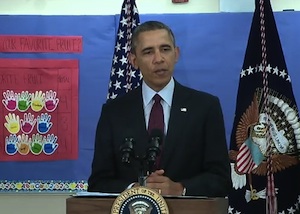Obama 2015 Budget Proposes 'ConnectEDucators' Grants, New Race to the Top Programs, State Ed Tech Directors
|

President Obama introduced his FY 2015 budget proposal in Washington, DC this morning.
|
The Obama administration is proposing bringing back federal funding earmarked specifically for education technology. In its fiscal 2015 budget proposal, revealed publicly today, the administration included $200 million in district-level, tech-focused competitive and formula grants in a program called "ConnectEDucators."
The ConnectEDucators program, part of the administration's broader ConnectED initiative, is designed to help educators "leverage technology and data to personalize learning and improve college- and career-ready instruction, ensuring that as schools increase access to broadband Internet through the ConnectED Initiative, teachers and leaders are prepared to use these resources in a way that increases student learning and achievement," according to information released by the United States Department of Education.
ConnectEDucators will also fund leadership positions at the state level through formula grants. According to information released by ED, part of the $200 million would be used "to help enhance state and local capacity to support the transition to digital learning." In a speech earlier today, Richard Culatta, who heads up ED's Office of Educational Technology, explained that would include education technology directors and deputies for individual states.
Another proposal, the "Opportunity, Growth, and Security Initiative," requests an additional $300 million for teacher professional development. The initiative is targeting 100,000 teachers spanning 500 districts.
ED's FY 2015 budget, as proposed by the administration today, includes a total of $68.6 billion in discretionary appropriations (a 2 percent increase over last year's appropriations), about 23 percent of which is focused on "specific areas and reforms designed to leverage major changes in educational opportunity and excellence for all students, including the expansion of access to high-quality preschool, data-driven instruction based on college- and career-ready standards, making college more affordable, and mitigating the effects of poverty on educational outcomes."
Eighty-nine percent of the discretionary spending is targeted to formula grants, the remainder on competitive grants, such as ConnectEDucators.
"President Obama's budget request reflects his strong belief that education is a vital investment in the nation's economic competitiveness, in its people, and in its communities," said Arne Duncan, education secretary, in a prepared statement. "Despite the encouraging progress we've seen, wide opportunity and achievement gaps continue to hurt many families, which puts our nation's economy and future at risk. We must continue to invest in the reforms taking hold in classrooms across the country, led by the hard work of our educators. America's public schools are the path to the middle class for children from hard-working families in every community, but too many students lack access to the quality education and supports that make the journey to college and the middle class possible."
One education group, however, said that while the budget contained some promising ideas, it failed to back up those ideas with adequate funding, particularly in the area of leadership development. In a published statement, the National Association of Secondary School Principals wrote: "Dedicated leadership-development funds under the School Leadership Program received just a modest $9 million increase to $35 million. Yes, the option of leadership development is woven throughout other programs under Title II, but history tells us that states and districts rarely use those funds for professional development for principals. And our nation's school leaders need that training and support more than ever as they strive to implement new college and career-ready standards and teacher evaluation system under new accountability requirements."
The group added: "Encouraged though we are by the ConnectED investment, we are equally disappointed by the president's hefty proposed investment in competitive grant proposals at the expense of formula programs. With dramatic increases in Race to the Top and School Turnaround programs, and new, smaller scale competitive grants in areas like career/technical education and special education, the president renews his commitment to create an education system that tilts toward the "haves." A competitive grant program necessarily has winners and losers, and the latter are far too typically the poorer, rural districts that often lack the support to write and compete for grants successfully. As equity is the number-one priority, we strongly encourage the administration to rethink these competitive programs and make a strong investment in formula programs like Title I and IDEA."
Other education highlights from the 2015 budget proposal include:
- $150 million for a new program focused on "providing students challenging, relevant learning experiences" that will help boost their readiness for colleges and careers through partnerships with colleges, universities and businesses;
- $300 million for a new Race to the Top for Equity and Opportunity competition designed to improve achievement for high-needs students;
- Support for a Preschool for All initiative "to provide all low- and moderate-income 4-year-olds with access to high-quality preschool, while encouraging [s]tates to expand those programs to reach additional children from middle-class families and establish full-day kindergarten policies," according to the White House;
- Early Head Start-Child Care Partnerships to provide care for 100,000 infants and toddlers; and
- An expansion of the Promise Zone initiative, with "35 new Promise Neighborhoods and up to 10 new Choice Neighborhoods."
Further details can be found on the Obama Administration's budget portal.
Dian Schaffhauser contributed to this article.